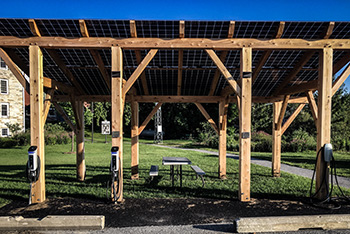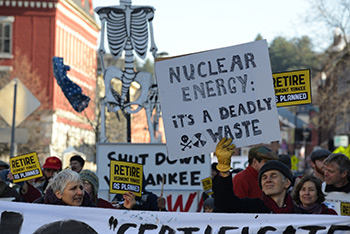Environmental



Vermont’s commitment to the environment goes beyond just reducing greenhouse gas emissions and promoting renewable energy. The state’s efforts to preserve its natural beauty and protect its wildlife and natural resources have been ongoing for decades.
Water Quality – Protecting our Lakes & Rivers
One of the state’s most significant environmental achievements has been the cleanup of Lake Champlain, which is a critical water source for the state. In 2015, Vermont passed a Clean Water Act that provides funding for water quality projects and regulates agricultural runoff to prevent nutrient pollution. The state has also worked to restore wetlands and protect watersheds to reduce the impact of stormwater runoff on the lake.
Reduce, Reuse & Recycle is a Way of Life
In addition to water quality, Vermont has also taken steps to reduce waste and promote sustainable practices. The state has a robust composting program, which diverts food scraps and other organic waste from landfills and turns it into nutrient-rich soil. The state has also banned single-use plastic bags and styrofoam containers, and encourages residents to reduce waste by using reusable bags and containers. The state also has a robust program, Efficiency Vermont, designed to improve the energy-efficiency of Vermont’s new and aging housing market. In efforst that is both intended to reduce carbon emmission and lower cost of energy for Vermonters.
Land Stewardship & Environmental Protection
Another significant environmental initiative in Vermont is Act 250, which was passed in 1970 to promote smart growth and protect open lands from development. The law requires developers to obtain permits and undergo environmental reviews before building, ensuring that development is sustainable and does not harm the environment. Act 250 has been credited with preserving Vermont’s rural character and natural beauty.
A Commitment to Combatting Climate Change
Vermonters take climate science seriously and contribute to fighting the effects. Vermont’s long-term Energy Plan sets the ambitious goal of having 90% of the state’s energy generated by renewables by 2050. In fact, Burlington has already surpassed the goal and was one of the first US cities to hit 100% renewables.
Overall, Vermont’s environmental commitment is rooted in the state’s values and its desire to preserve its unique natural resources for future generations. As climate change continues to impact the world, Vermont’s efforts to reduce greenhouse gas emissions, protect its water and land resources, and promote sustainable practices serve as a model for other states and countries to follow.
In recent years, Vermont has seen an influx of people to the state as they take refuge from climate-related disasters such as wildfires, extreme summer temperatures, or flooding. While our area does see the effects of climate change, those effects are far less dramatic and the state is committed to doing its part to reduce its impacts.
Questions or Comments?


